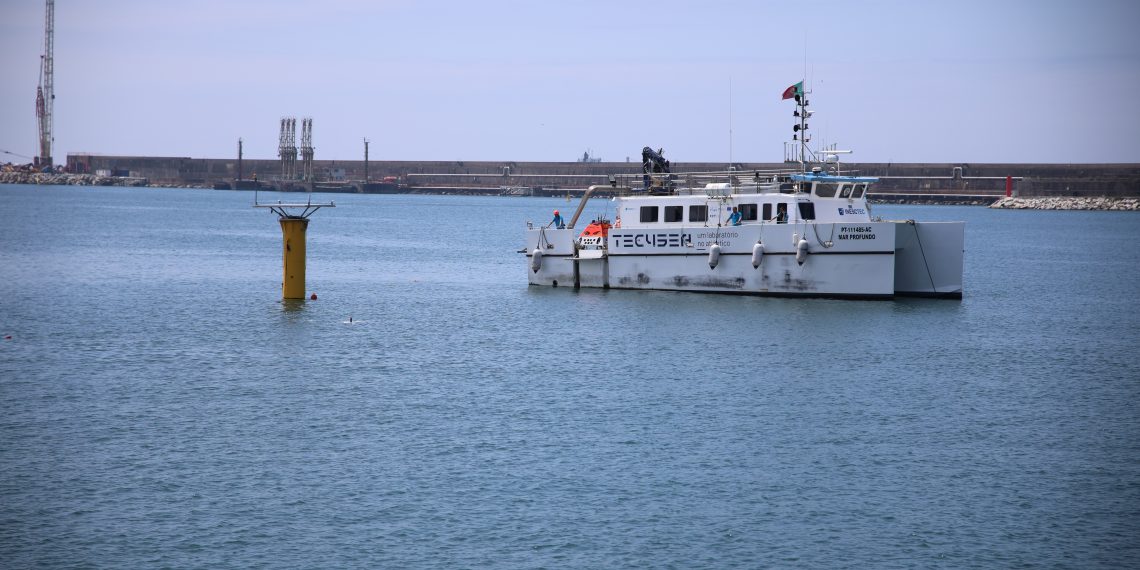Over the next six years, INESCTEC.OCEAN – led by INESC TEC – will promote the development of emerging ocean sectors, like offshore renewable energy sources, deep-sea monitoring, environmental impact assessment of human activities at sea, or offshore aquaculture. This Centre of Excellence – with a European and national investment of more than €30M – will promote research and development activities in these areas, the creation of a network of onshore and offshore technological infrastructures to develop and test technologies, the advanced training of human resources, and a closer connection between science and the business sector, boosting science-based innovation. INESCTEC.OCEAN is the fifth Portuguese Centre of Excellence – the first dedicated to the Ocean, and it stems from an approved submission to Teaming for Excellence, within the scope of Horizon’s Europe Widening programme.
Portugal’s coastline is close to 2500 kilometres, and the country holds one of the largest exclusive economic zones in the world – the fifth at European level -, reaching more than 1.7 million square kilometres (representing 95% of the national territory). The maritime triangle that lies between mainland Portugal and the archipelagos of Madeira and the Azores constitutes 48% of all marine waters connected to the European continent. “Our territory features privileged conditions for the development of the Blue Economy; now, the country will benefit from a Centre of Excellence, which aims to leverage all this potential – through research and ocean engineering,” explained José Manuel Mendonça, responsible for the high-level coordination of the INESCTEC.OCEAN application and former chairman of the Board of Directors of INESC TEC.
Led by INESC TEC, the project – taking place between 2025 and 2031 – features Fórum Oceano, Cluster do Mar Português, and APDL – Administração dos Portos do Douro, Leixões and Viana do Castelo (Portugal). It will also welcome the Norwegian R&D Centre SINTEF.OCEAN – the main Norwegian Ocean R&D Centre, with more than 70 years of experience, taking on a mentoring role in the process of setting up INESCTEC.OCEAN.
The Centre of Excellence will focus on promoting scientific advances; creating conditions for greater cooperation between academia, business associations, incubators and accelerators, financing entities and investors; bringing industry and research closer together, boosting innovation and knowledge transfer; leveraging a set of new technological infrastructures and readapting existing ones. This Centre will address the scientific and technological needs of emerging areas, e.g., offshore renewable energy, environmental impact monitoring and assessment, or aquaculture – with an impact on sectors considered “traditional”, like fisheries or harbour and logistics activity.
Research, training, innovation and collaboration: the role of INESCTEC.OCEAN
How? “The goal is for INESCTEC.OCEAN to become an international reference in the area of ocean engineering, taking advantage of our location, close to the Atlantic Ocean, which is a privileged position. In this sense, we foresee the creation of four scientific programmes (in liaison with the industry) dedicated to fields of knowledge like Marine Structures, Marine Robotics, Ocean Energy and Ocean Data, as well as the active participation in more than 50 cooperation projects with the industry sector, towards addressing the needs of the market,” stated José Manuel Mendonça.
The Centre of Excellence will also focus on education and advanced human resources training, for example by funding PhD grants covering several ocean engineering domains.
The connection to the industry will focus on collaborative projects and training, but also on the creation of an ecosystem that fosters technology transfer, the emergence of new businesses and the attraction of investment. This endeavour also foresees the creation of industry affiliation programmes, pilot-projects or demonstrations with the involvement of SINTEF.OCEAN, the development and licensing of solutions for SMEs and support for the creation of ocean engineering start-ups.
Finally, INESCTEC.OCEAN will create a network of onshore and offshore infrastructures for the development and testing of technologies, readjusting and equipping existing infrastructures and creating new spaces for experimentation. “Our goal is to gather all resources needed to advance the current infrastructures, like the HUB AZUL Leixões I (Tec4Sea) or the Aguçadoura testing platform, near Póvoa de Varzim”.
The path to 2031
Through these actions, the Centre of Excellence will contribute to attracting talent and creating highly qualified jobs, address the needs of the industry, and promote the establishment of tech-based start-ups, while providing information to support decision-making on the sustainable use of the ocean resources. In 2031, INESCTEC.OCEAN’s activity is expected to exceed €20M.
Until then, the Centre of Excellence will be incubated at INESC TEC for at least four years. The project, stemming from an application to the Teaming for Excellence call of Horizon Europe’s Widening programme, received a funding of more than €30M: €15M provided by the European Union’s Horizon Europe Programme, and the remaining amount by the Portuguese Government – through the Foundation for Science and Technology and other different mechanisms.
“It was a very competitive call, and our application was quite unique at the European level. In fact, there are only four Centres of Excellence in Portugal; INESCTEC.OCEAN was the fifth to be approved – and it is the first in Ocean engineering,” recalled José Manuel Mendonça.
Over the past four years, INESC TEC has been developing multiple projects in this sector – which currently represent about 10% of the Institute’s research activity. In the last six years, this fundraising of ocean-related R&D projects went from €4M/year (2017) to more than €13.3M/year (2022), with a team of more than 70 researchers. In addition, INESC TEC is responsible for leading technological infrastructures like BLUE HUB Leixões I, the CEO – Companhia da Energia Oceânica and TEC4Sea, which includes the research vessel Mar Profundo.



 News, current topics, curiosities and so much more about INESC TEC and its community!
News, current topics, curiosities and so much more about INESC TEC and its community!